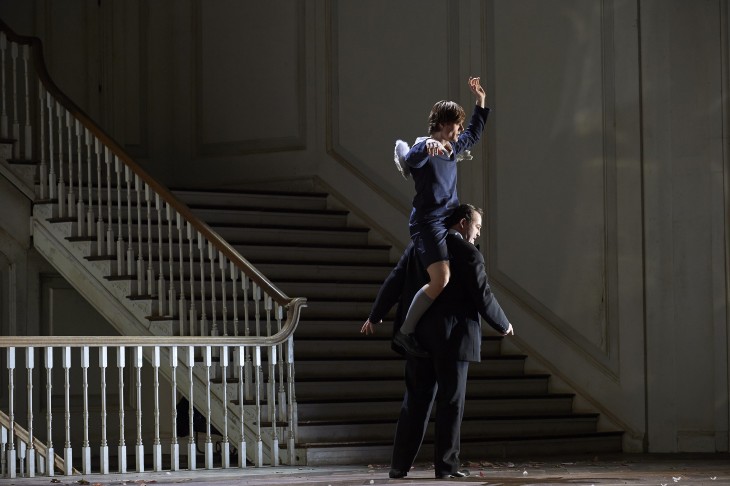A true ensemble piece, Marriage of Figaro’s cast is solid throughout, each singer complementing the next and all fairly evenly matched with clean, clear performances
Perhaps one of Mozart’s most iconic operas, Marriage of Figaro is a continuation of the Barber of Seville. Last we saw Figaro he was the Barber, always reaching, here he’s worked his way up to the valet for Count Almaviva. Where Rossini’s Figaro is full of fun, Mozart’s is less comedic and not as laid back. Director Claus Guth’s version is perhaps even less buffa, but the production still delivered many opportunities for the audience at the Four Seasons Centre to laugh out loud.
Not typically a fan of updated or radical reimaginings of classic operas, Guth does a surprisingly fine job in Figaro. What is typically a tale of class struggle, is really here, more a question of male versus female. The juxtaposition of the Mozart comedy and the stark monochromatic set – washed out, falling into disrepair, dried leaves and dead ravens scattered throughout – works to hammer home the idea of the dying class system.
Figaro is perhaps one of the most widely known figures in opera and is the epitome of the social climber, and a great example of working the class structure. The opera also works because its story is timeless, and the interactions between the characters are beautifully written. A true ensemble piece, this production’s cast is solid throughout, each singer complementing the next and all fairly evenly matched with clean, clear performances.
Erin Wall as the Countess Rosina delivers two earthy, goose bump inducing arias in Porgi amor and Dove sono, full of colour, and depth of emotion coming through. Josef Wagner plays a solid Figaro, nerdy and not quite so clever. One can always count on Russell Braun to deliver, and he does not disappoint here as a sexually restless Count Almaviva. Emily Fons is a strong Cherubino, and Uli Kirsch as Cupid, is Cherubino’s silent mirror making appearances for arias and ensemble pieces, causing delightful trouble.
There are many ways a conductor can interpret Figaro, arranging the tempo and phrasing to enhance different aspects of the music. Johannes Debus chose what felt like a scaled-back version of the famous overture, setting the tone for the evening. It was full of light transparent textures, never overpowering the singers which worked well to satisfy the audience.
Mozart and Da Ponte crafted timeless characters that work well together. Mount that with simply beautiful music and you have the makings of a thoroughly enjoyable night at the opera. Debus hoped “we all should leave the hall uplifted and energised,” and we certainly do.
Marriage of Figaro runs through February 27. Visit COC for tickets.


Leave a Reply